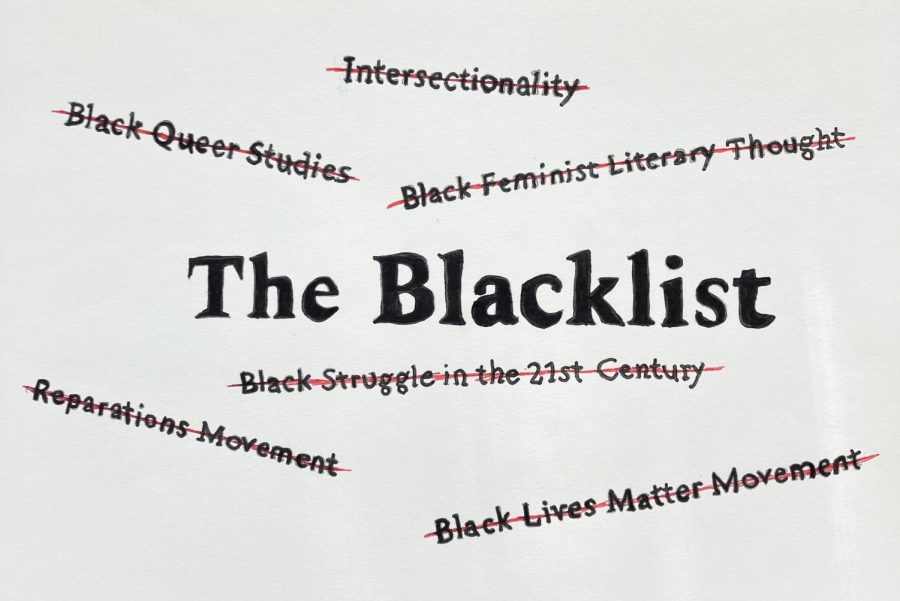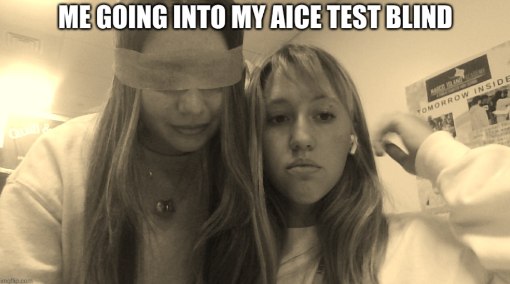The Blacklist
“A bunch of horse manure” – Ron DeSantis
The courses that were removed from AP African American Studies
February 8, 2023
On February 1st, the commencement of Black History Month, a month dedicated to recognizing the achievements, contributions, and sacrifices made by African Americans, the very foundation of African American History and the study of influential individuals, was expunged from a newly proposed AP African American Studies Course.

After the College Board proposed the new AP course, it was rejected by the Florida Department of Education in January suggesting that a number of changes would need to be made to the course material for it to be released. This was not the first time content has been ostracized from education, with topics of race, gender, and sexual identity, all banned from educational settings by Governor DeSantis & Florida legislators.
The College Board spent a decade developing the African American studies AP course and has offered it to more than 60 schools in the country. The course curriculum explores key historic events and social movements that shape Black experiences, the diversity & global connections of African societies before slavery, and their contributions to literature and art.
On the first of the month, the College Board released its newly revised version of the course excluding a number of integral topics crucial to African American History including: Black Queer Studies, Intersectionality, the Black Lives Matter movement, Black Feminist Literary Thought, the Reparations Movement, and Black Study and Black Struggle in the 21st Century.
Education has often been the subject of vitriolic partisan debate, and the College Board’s decision to construct a curriculum over the true untold history of race in America, one of the most charged subjects in the country, was a failed attempt at overcoming the controversy.
Columbia Professor Kimberlé W. Krenshaw, one of the influential individuals whose writings and impacts were removed from the curriculum, explained that one of the main educational purposes of the course was to prevent the politicism of African American history, which was precisely what caused the removal of aspects of the curriculum. “The very same set of circumstances that presented the need for the course also created the backlash against the content that people don’t like.”
When you devalue my history, and say it lacks educational merit, that is demeaning to us. — Reverend R.B Holmes Jr.
Influential works and contributions made by other African American individuals: Roderick Ferguson, a Yale professor who has written about queer social movements, Ta-Nehisi Coates, the author who has made the case for reparations for slavery, and Gloria Jean Watkins (Bell Hooks) who shaped discussions about race, feminism and class, were also expunged from the course.
In the letter that addressed the decision made by the College Board of Florida, DeSantis’ administration concluded that the course contents “violated state law” and that the class “significantly lacks educational value.” With this, DeSantis insinuated that the influential individuals in African American History and their contributions, which were removed from the course, are not valuable.

DeSantis stated that “Florida wants education, not indoctrination”, and claimed the course violates the state’s Stop the Wrongs to Our Kids and Employees (Stop WOKE) Act that was signed last April. The Stop WOKE Act limited what could be taught in K-12 and higher education classrooms, by neutralizing discussions of topics such as race, gender, and sexuality.
DeSantis particularly criticized the course’s topics of intersectionality and queer theory, “Who would say that an important part of Black history is queer theory? That is somebody pushing an agenda on our kids.” Yale professor Roderick Ferguson, whose studies and work surrounding queer theory and social movements were removed from the course material.
In his reasoning for having removed the supplemental course materials, DeSantis puts forth the idea that the only history that should be taught in the curriculum is American history. “I view it as American history, I don’t view it as a separate history.” If this was the case, how are students supposed to be educated on diversity and race if the only history being taught is American?
If history only focuses on one culture, we won’t know the full story.
— 17-year-old student Chyna Lee Hunter
Ironically enough, DeSantis’ decisions that were made to limit how educators taught race, violated current legislation under Florida Statute 1003.42(2)(H) which stated that it is required to teach the accurate history of African Americans, which included the history of “African peoples before the political conflicts that led to the development of slavery, the passage to America, the enslavement experience, abolition, and the contributions of African Americans to society.”
The statute also ruled that in teaching these required concepts it is indispensable that these topics are approached “efficiently and faithfully” using the mandated works and materials that meet the “highest standards for professionalism and historic accuracy”.
By removing the supplemental course materials that delved into topics of focus that weren’t taught in typical curriculums or American History, DeSantis has deprived students of the historically accurate enriching resources that would have aided them in their knowledge & understanding of true African American History.









